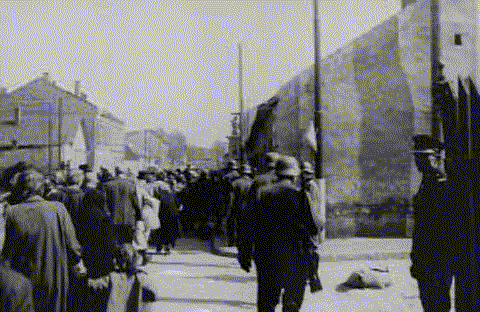An Exploration of the Effects of the Holocaust on Survivors and Their Children
by Virginia Hamner
 In the
wake of the Holocaust several narratives have been written by survivors
and their children in an attempt to help the world understand what happened
so that the terror might never be repeated. One such narrative that joins
the story of a survivor to the troubles of his son is Art Spiegelman's
"comic book biography" MAUS. His Pulitzer Prize winning
set of two books: "My Father Bleeds History" and "And Here
My Troubles Began" explore not only the events of the Holocaust and
their effect on Vladek Spiegelman but also Art's relationship with Vladek
and Art's struggle to understand his feelings as a child of a survivor.
In this work, Art Spiegelman not only gives the reader a sense of the horror
that people faced in the Nazi concentration camps; he uses the book to
explore his father's response to his survival as well as his own troubles
as a member of the "second generation" of survivors. This site,
inspired by MAUS and using it as a giuding text, seeks to explore
the effects of the Holocaust on the people who walked through the gates
of Nazi camps and survived to make sure
that the world never forgets the horrendous crimes against humanity that
were committed inside those walls. Also, this site seeks to explore the
effects the Holocaust had on the "second generation" of survivors--the
children of camp survivors who never experienced the horrors first hand
but have to come to terms with what their parents experienced. These people
carry the burden of making sure the world remembers even when their parents
are gone.
In the
wake of the Holocaust several narratives have been written by survivors
and their children in an attempt to help the world understand what happened
so that the terror might never be repeated. One such narrative that joins
the story of a survivor to the troubles of his son is Art Spiegelman's
"comic book biography" MAUS. His Pulitzer Prize winning
set of two books: "My Father Bleeds History" and "And Here
My Troubles Began" explore not only the events of the Holocaust and
their effect on Vladek Spiegelman but also Art's relationship with Vladek
and Art's struggle to understand his feelings as a child of a survivor.
In this work, Art Spiegelman not only gives the reader a sense of the horror
that people faced in the Nazi concentration camps; he uses the book to
explore his father's response to his survival as well as his own troubles
as a member of the "second generation" of survivors. This site,
inspired by MAUS and using it as a giuding text, seeks to explore
the effects of the Holocaust on the people who walked through the gates
of Nazi camps and survived to make sure
that the world never forgets the horrendous crimes against humanity that
were committed inside those walls. Also, this site seeks to explore the
effects the Holocaust had on the "second generation" of survivors--the
children of camp survivors who never experienced the horrors first hand
but have to come to terms with what their parents experienced. These people
carry the burden of making sure the world remembers even when their parents
are gone.
"The Saved"--The effects on survivors
The "Second Generation of Survivors"--The effects on the children of survivors
Images of the "Drowned" and the "Saved" in Moby Dick, MAUS, and Beloved